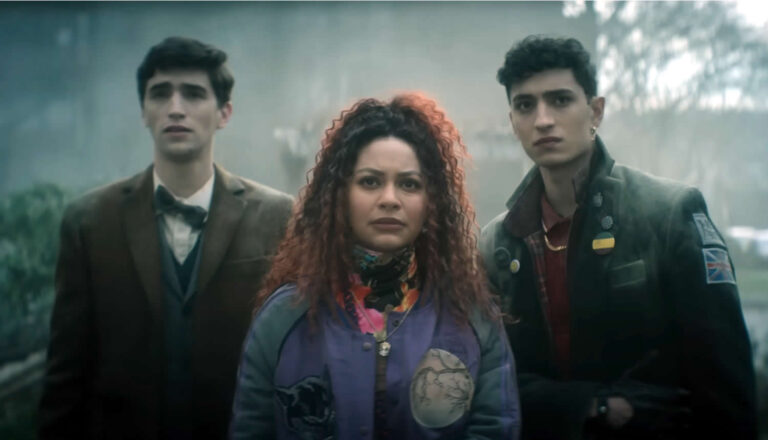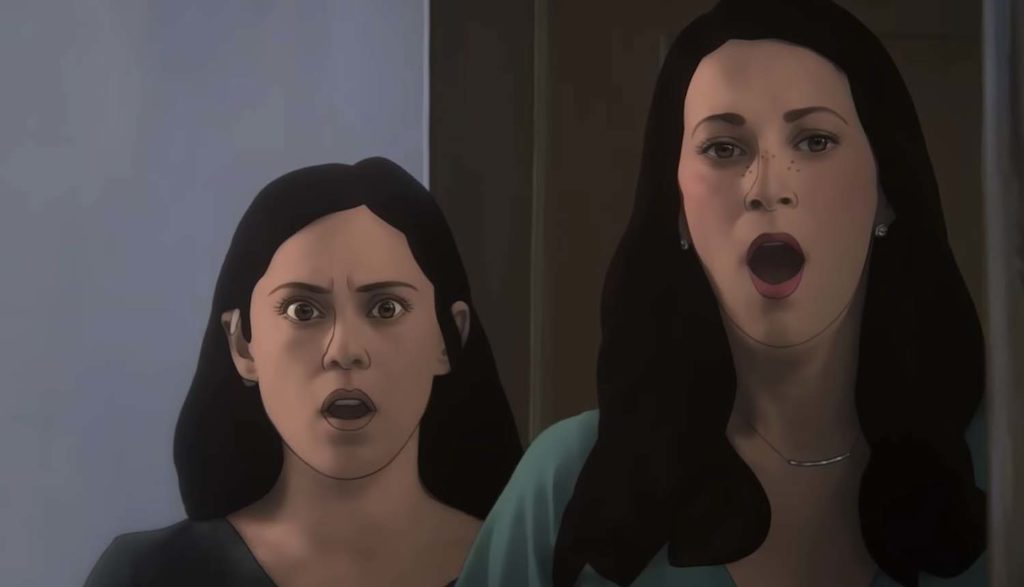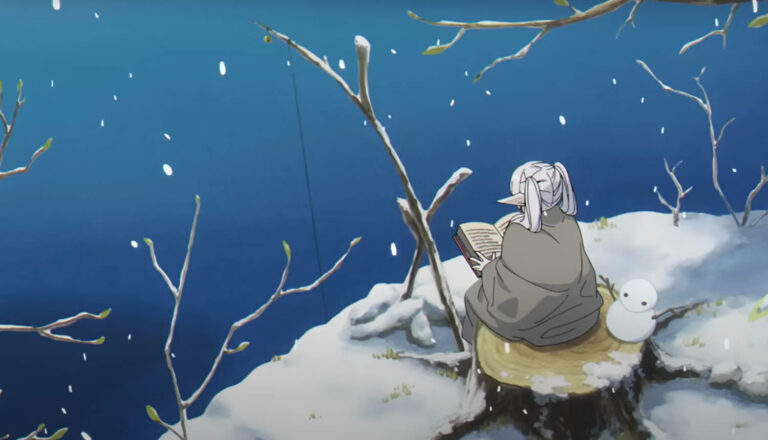
Dead Boy Detectives
Dead Boy Detectives targets teens in style and story. But it comes with very adult, problematic content.

Albert Einstein said that time was the fourth dimension. Funny that we experience it as one.
Time is wholly linear as far as we know—past begets present begets future. It’s quite one-dimensional when you think about it. You can’t know what the future holds. You can’t go back again. We are stuck on the line, inching only forward second by second, day by day, year by year.
But what if you can go back again? What if you can get off the line? And what if all it took was a near-fatal car accident, your dead father and perhaps a healthy dose of mental illness?
Welcome to the world of Alma Winograd-Diaz, a hard-drinking, hard-thinking, hard-luck twentysomething who’s lost her tether to time.
As it turns out, her entire family (on her dad’s side) are time-travelers. It caused her grandmother—her dad’s mom—to go completely crazy. It also caused Alma to spend her formative years without her dad.
Because when Alma was just a little girl, her father, Jacob, took her out on Halloween for a little extra late-night trick-or-treating. But then “work” called. He told Alma to stay right where she was—on that sidewalk—and he’d be right back.
He wasn’t. He died in an accident, she was told. But as it turns out, that night Jacob figured out how to merge all the different Jacobs from all the different timelines into one. Which, of course, resulted in this Alma growing up without her dad.
That is, until Jacob figured out how to return to this Alma’s timeline and teach her how to merge her own selves.
Alma was already a troubled young woman. Her past was littered with drugs and detention centers and suicide attempts. But now, she’s trying to contend with a new reality—one where her dad was present and taught her piano and helped her to get a job as a professor.
Perhaps it wouldn’t be so bad, only Alma knows she can do more. She wants to use her abilities to help other members of their family (like her non-time-traveling but still multiverse affected mom who seems to be suffering from depression).
But Jacob is frightened of their abilities. He worries that if Alma keeps traveling through time, she’ll lose herself, just like he did. Only this time, he isn’t sure they’ll be able to mend the broken timeline.
Undone, from the creators of the thoughtful, crass and rather nihilistic toon BoJack Horseman, is unlike anything else on television.
First, the animation. Yes, this is, technically, a cartoon. But its animation is done via rotoscope—a technique in which regular ol’ actors are filmed, as you would as live-action movie, and then re-traced—blending some characteristics of both live action and animation. (Well-known examples are few, but 1980s-circa band a-ha’s old video for “Take on Me” was an example of rotoscoping.) The effect feels less like BoJack and more like a surreal, often dreamy world that allows Alma to soar in the cosmos and then land back in her hospital bed. It narratively allows the viewer to feel just as unhinged from reality as Alma does.
We find a certain beauty in the storytelling, too. The time-shifting conceit is, on some level, secondary to Alma’s poignant struggle to find connection and reconciliation. Let’s face it: This girl is messed up—lost and confused and angry and dealing with issues she should really see a counselor about. To watch her heal a bit—to embrace her family’s imperfect love, for instance—is one of the show’s rewards.
But those rewards cost the viewer something, too.
First, we’ve got to grapple with Undone’s mental-illness-as-superpower conceit. Those who haven’t grappled with mental illness in real life might embrace this idea without a hitch. But I do worry that for those who suffer from mental illness—and some forms can make the sufferer think that he’s the only sane one in a mad, mad world—the show could potentially undercut the efforts of many a counselor.
Undone also features a messy sense of spirituality. While Alma’s mother is a firm Catholic, Alma’s abilities seem pegged to a more pagan, animist ethos. Repeatedly, we hear about how shamans and medicine men back in the day had the same abilities she has—abilities that the Western world dismisses out of hand (according to Alma’s dead pops). A Catholic priest—who’s something of an amateur anthropologist, too—seems to keep an open mind about the experiences of more ancient, less “advanced” cultures, too.
Then, of course, we’ve got the show’s content issues, of which it has plenty. Alma lives with her boyfriend, and we see them in bed together. In the opening episode, Alma, her sister (Becca) and a bartender they just met hunker down and play a stripped-down game of truth or dare—one that winds up with the bartender and Becca (who’s engaged to someone else) at the very least making out.
While intimate moments such as these are animated, as are the show’s moments of violence, the rotoscoping lends more reality to these scenes than you’d find in more traditional animated programs. And there’s obviously no way to soften the language we hear or its liberal use of alcohol.
Undone is, on one level, a scintillating achievement. It’s also deeply problematic. And for many, that may push Undone into its own special timeline: never.
Alma merges her own timelines to create a single version of herself in the same timeline as her dad. But when she arrives, she discovers that her mom in this timeline suffers from depression and her sister, Becca, can also time travel.
Alma and Becca use their abilities to travel through time. Alma sees a flashing light when her timelines all merge together, and she quickly learns that she retains the memories from all her lives.
Alma teaches a college course on Nahua philosophy. In it, she states that Teotzin is a “sacred power” that animates and is everything, and that the appearance that all things and all people are separate is only an illusion.
A woman is hit by a truck. Alma later says the woman was helped by an ambulance.
In one timeline, Alma’s mother seems to be suffering from depression—crying when she thinks nobody is looking and sleeping through the day. It’s clear that she’s hiding something from the family, but her husband is worried that if he and Alma use their abilities to help her, they’ll cause more harm than healing.
In another timeline, Alma’s family worries that she, Alma, is mentally ill. They discuss her willingness to take medication and check in to a mental health facility.
We see Alma on the toilet with exposed thighs and in the shower from the shoulders up. When Becca tells the family she and her husband are trying to get pregnant, Alma sarcastically congratulates her on having unprotected sex.
We hear uses of the f-word and s-word a few times, as well as misuses of God’s name. Alma comments that many foreigners changed their first names when immigrating because they were forced to assimilate.
Alma is recovering from her car crash and begins to sense that she’s unmoored from time. Her dead father sits in the chair beside her and eventually asks for a big favor: to help uncover how he was killed.
We flash back to the Halloween night that Alma’s father died. He rushes off while taking Alma trick-or-treating, promising to return. Eventually, Alma falls asleep on the sidewalk and has to be taken home by a kindly police officer. She skips time often, reliving often-painful conversations with her mother and sister. At one juncture, she seems to have the ability to jump two weeks into the future. She also envisions herself in both a beautiful woodland scene (perhaps a picture that one of her students drew her) and floating in a starry sky.
Her father (again, who’s dead) tells her that she may be experiencing time in a “non-linear fashion,” but he also suggests that this could be “some sort of fever-dream, morphine-drip head trauma type of thing.” He suggests that Alma has abilities like shamans of old—the type of people that Western society simply throws out on the streets for being crazy. In visions, Alma sees her whole future play out reasonably predictably on one possible timeline (including a handful of funerals in her family’s Catholic church). But her father suggests that if she chooses to help him, time can be a relative thing—and she sees pictures of herself and her family in various, flexible age stages as her father steps out of a cave dressed completely in white. (He refers to these dreamy states as a “spirit realm.”)
We see a flashback of Alma attempting suicide: She lies on a bathroom floor, blood covering her wrist as her worried mother discovers her. We also hear from sister Becca how Alma always stole the spotlight from her, be it getting busted for marijuana or cutting herself. Alma’s “boyfriend” (whom she actually broke up with last episode) realizes that Alma’s forgotten they broke up at all, and so he pretends like nothing happened. Characters use the f-word twice and the s-word once.
After getting into a fight with her sister at church, Alma suffers a nearly fatal car accident when she thinks she sees her father along the side of the road.
We see the crash in some detail: Alma’s head smashes into the windshield when her car crumples against a telephone pole. Afterward, we see her unconscious, her head against the steering wheel as blood drips down.
Beforehand, after a night of drinking tequila shots with her newly engaged sister, Alma comes home (likely driving home drunk), takes off her shirt, climbs on her live-in boyfriend and tells him that she’s “humping” his rear. The two kiss and cuddle. “Can you promise me we’re not going to be like one of those boring couples that gets married and settles down and has babies and is, like, all happy?” She says. He promises that they can be vagabonds for the rest of their lives (but that doesn’t stop her from breaking up with him later).
After another night of drinking, Alma, Becca and a bartender head to Alma’s house and play a game of truth or dare. By the time we get to that point, both Alma and the bartender are shirtless (Alma’s wearing a bra), and Alma convinces the barkeep and his sister to kiss as part of the game. The two make out as Alma leaves the room and vomits in the bathroom.
Alma tells Becca that she’s “trying to drink less.” We hear about her grandmother, who ended up on lithium and slammed a broom handle into a television set while her kids were watching Howdy Doody. There’s talk of Alma being a virgin (which, all eventually agree, she definitely is not). We see her from the shoulders up in the shower.
Becca and their mother listen to a Catholic priest talk about the wisdom of indigenous people and insist that today’s culture has lost all sense of nature and the environment. Characters say the f- and s-word both once and misuse God’s name about seven or eight times. Alma also spells out the c-word, using it to refer to one of the little girls she’s watching at a daycare center.


Paul Asay has been part of the Plugged In staff since 2007, watching and reviewing roughly 15 quintillion movies and television shows. He’s written for a number of other publications, too, including Time, The Washington Post and Christianity Today. The author of several books, Paul loves to find spirituality in unexpected places, including popular entertainment, and he loves all things superhero. His vices include James Bond films, Mountain Dew and terrible B-grade movies. He’s married, has two children and a neurotic dog, runs marathons on occasion and hopes to someday own his own tuxedo. Feel free to follow him on Twitter @AsayPaul.

Emily studied film and writing when she was in college. And when she isn’t being way too competitive while playing board games, she enjoys food, sleep, and geeking out with her husband indulging in their “nerdoms,” which is the collective fan cultures of everything they love, such as Star Wars, Star Trek, Stargate and Lord of the Rings.

Dead Boy Detectives targets teens in style and story. But it comes with very adult, problematic content.

An elf mage contemplates on connection and regret as she watches her human friends grow old and pass away.